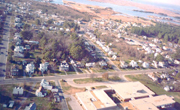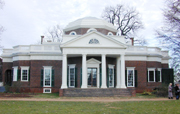|
||
Way DownstreamIn Annapolis, there’s a new leader for the Maryland League of Conservation Voters, the environmental watchdog and lobby. Cindy Schwartz steps over from the League of Conservation Voters national office in Washington, where she served as senior vice president for state outreach. She arrives just in time to jump into the heat of campaign summer 2006. “The large number of open legislative seats causing a domino effect up and down the ballot this election year gives us a real chance to send candidates to the State House who will protect our air, land and water,” she said … On the Eastern Shore, the Clean Sweep team elected to the Crisfield city council to end developer In Virginia, folks are slightly confused by the Orwellian pronouncements of state environmental officials about the health of rivers. In 1996, seven percent of the rivers sampled were declared polluted. Last week, the number had grown to 63 percent. Yet the Department of Environmental Quality’s Gerard Seeley advised that people need better In Lithuania, UNESCO, the U.N.’s environmental and cultural body, last week added the Sichuan Giant Panda Sanctuary in China and crusader castles in Syria to the World Heritage list, the effort to protect treasures considered part of the world’s cultural legacy. Closest to us on the list of over 800 are: Independence Hall in Philadelphia and Monticello and the University of Virginia in Charlottesville … Our Creature Feature comes from Cape Canaveral, where NASA has stepped up efforts to protect space shuttles from an unlikely predator: vultures. After one hit the shuttle Discovery just after lift-off last year causing no damage, space officials set in motion a strategy to guard rockets from things that exist on a diet of the dead. In the first three months of their Roadkill Roundup, Fish and Wildlife Service workers and volunteers removed more than 100 dead creatures from the roads, everything from raccoons to armadillos to hogs. The program must be working: Discovery blasted into space July 4 without vulture interference and made it back safe this week. |
||
|
|
||
|
© COPYRIGHT 2004 by New Bay Enterprises, Inc. All rights reserved.
|



 shenanigans got out their brooms last week: The council voted 4-0 to end a controversial contract with a group of developers that had been given broad authority to redo the downtown. The group, known as Crisfield Associates, also would have profited from selling city-owned land. Now they’ll only get expense checks on the way out of town …
shenanigans got out their brooms last week: The council voted 4-0 to end a controversial contract with a group of developers that had been given broad authority to redo the downtown. The group, known as Crisfield Associates, also would have profited from selling city-owned land. Now they’ll only get expense checks on the way out of town … perspective. “Things are much better than they were 25 or 30 years ago,” he told the Times-Dispatch …
perspective. “Things are much better than they were 25 or 30 years ago,” he told the Times-Dispatch …